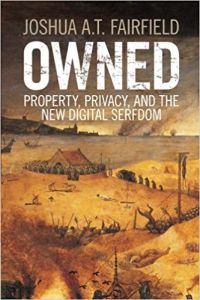Join getAbstract to access the summary!

Join getAbstract to access the summary!
Joshua A. T. Fairfield
Owned
Property, Privacy, and the New Digital Serfdom
Cambridge UP, 2017
What's inside?
The increasingly intrusive digital universe dangerously erodes your privacy and property rights.
Recommendation
Law professor Joshua A.T. Fairfield’s fascinating – and at times downright scary – study of how digital technology changes property rights touches on real-world court cases as well as on game-world magical swords. Fairfield cautions that society faces a crisis as technology reshapes the complicated arena of property rights. He sounds the alarm about dangerous developments eroding those rights, discusses implications and solutions, and explains why all this matters and what to do about it. getAbstract recommends his timely warning to anyone concerned about property, privacy, digital culture and personal freedom.
Summary
About the Author
Joshua A.T. Fairfield, JD, is a law professor at Washington and Lee University, where he specializes in technology and digital property.


















Comment on this summary